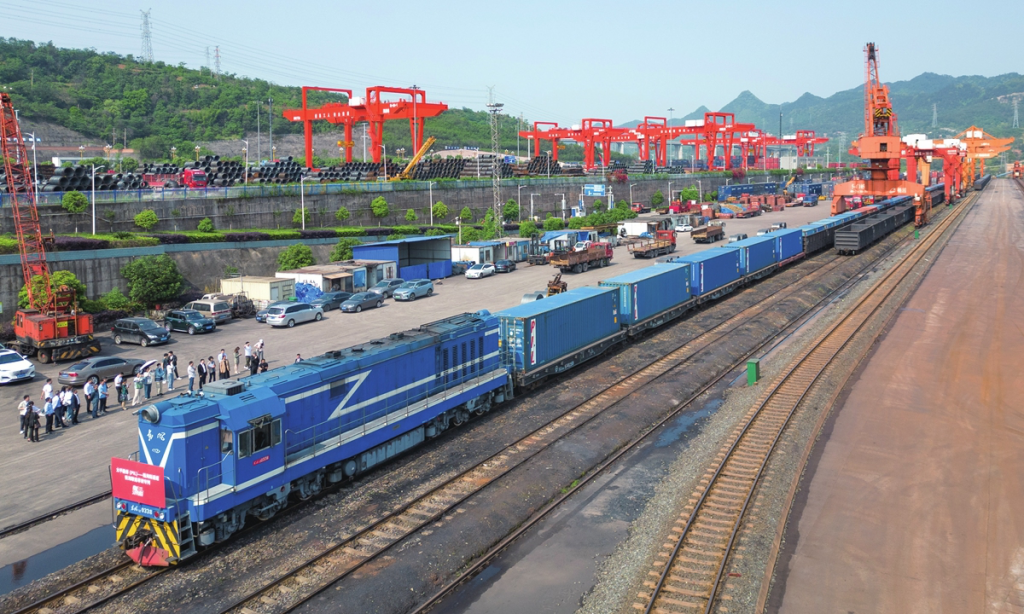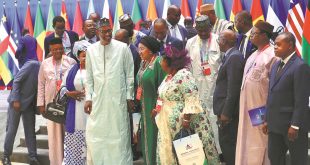Published: September 02,2024
By Liu Yang

A rail-sea intermodal train to Africa departs from Southwest China’s Chongqing on April 27, 2023. Photo: VCG
China-Africa cooperation is an example of the transformative model of regional and global cooperation based on mutual respect and common interests, said Nicholas Dweh Nimley, managing editor of South Liberia Post Online Newspaper.
Nicholas Dweh Nimley, managing editor of South Liberia Post Online Newspaper Photo: Courtesy of Nimley
As the 2024 Summit of the Forum on China-Africa Cooperation (FOCAC) approaches, Nimley hailed the economic and trade ties between China and the African continent, which has promoted economic growth, infrastructure development, and trade expansion among many African countries.
Through initiatives such as the China-proposed Belt and Road Initiative (BRI), China has invested heavily in key sectors such as transport, energy, and agriculture, promoting job creation and trade expansion, Nimley told the Global Times on Wednesday.
Furthermore, China’s approach emphasizes South-South Cooperation, reinforcing the idea that developing countries can work together to address common challenges such as poverty, climate change, and public health, he noted.
The new model not only contrasts traditional North-South power dynamics but also promotes self-reliance and sustainable development within the Global South. China’s engagement with Africa serves as a model for other regions to strengthen economic cooperation and promote common progress, he said.
Nimley noted the important role the BRI plays in China-Africa cooperation, highlighting that in Liberia and across Africa, the BRI has enabled significant infrastructure development and financial partnerships.
In his country, projects include road improvements and the construction of a new international airport that have improved connectivity and access to markets.
These developments have helped improve trade routes, attract foreign investment, and create new jobs, he said. “In addition, Chinese companies have entered into various public-private partnerships to facilitate technology transfer and capacity development.”
As of the end of 2023, China’s direct investment stock in Africa exceeded $40 billion, making it one of Africa’s major sources of foreign investment, according to the Xinhua News Agency.
In the past three years, Chinese companies have created more than 1.1 million local jobs. The economic and trade cooperation zones Chinese firms have invested in and built in Africa, in sectors such as agriculture, processing and manufacturing, trade logistics and other industries, have attracted more than 1,000 companies and helped increase Africa’s tax revenues and foreign exchange earnings from exports, Xinhua reported.
China has remained Africa’s largest trading partner for 15 consecutive years. In 2023, China-Africa trade reached $282.1 billion, up nearly 11 percent compared with 2021, which demonstrates the strong resilience of China-Africa trade.
Expectations for further cooperation
Noting the upcoming FOCAC summit, to take place in Beijing from September 4 to 6, Nimley said it will be an important opportunity to strengthen and diversify the China-Africa strategic partnership.
The meeting is expected to focus on strengthening existing cooperation and exploring new ways of cooperation. Possible key areas for new agreements could include technological innovation, with both sides working together to build digital infrastructure and promote e-commerce to stimulate economic growth, he said.
Renewable energy is another key area, as it could better utilize Africa’s vast natural resources with Chinese technological know-how, contribute to sustainable development, and address issues related to climate change, Nimley added.
In addition, there is a possibility of expanding cooperation in the health sector, focusing on the development of the region’s health sector and endemic preparedness. Moreover, agricultural modernization is essential, and China’s experience would help improve food security and rural development in Africa, he said.
In terms of the future cooperation, Nimley said that China and Africa have significant opportunities, especially in fighting climate change and developing new energy solutions, and collaboration in sustainability efforts is important as both regions face the immediate impact of climate change.
China can leverage technological advances in renewable energy such as solar and wind energies to help African countries diversify their energy mix and reduce their reliance on fossil fuels; while the African continent’s vast natural resources, combined with China’s manufacturing capability, could create more wealth for locals, he said.
Furthermore, investing in green infrastructure, including electricity transmission and smart grids, benefits both parties. The two sides could participate in capacity-building programs to improve regional expertise in environmental sustainability management.
By fostering closer research and development partnerships, China and Africa can not only combat climate change but also promote economic growth and resilience, ensuring a sustainable future for both regions, Nimley noted.
globaltimes.cn
 Africa -China Review Africa -China Cooperation and Transformation
Africa -China Review Africa -China Cooperation and Transformation
